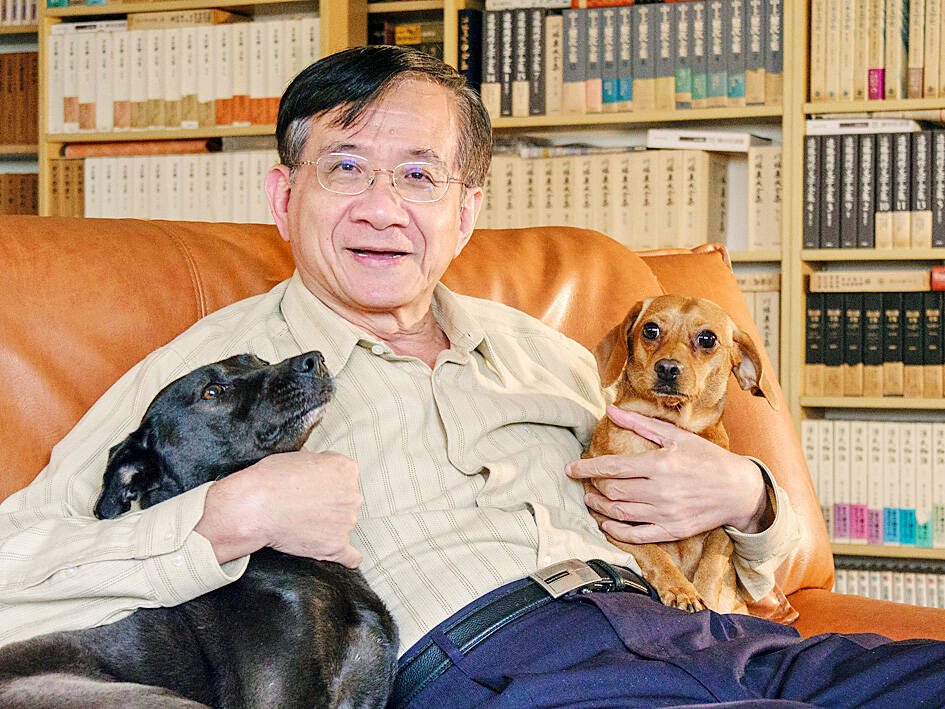A new Chinese translation of the Japanese literary classic The Tale of Genji by translator Lin Shui-fu (林水福) is to be published in the second half of this year.
In an interview, Lin told the Central News Agency that he was motivated to present a novel interpretation of The Tale of Genji by his belief that the “classics never grow old.”
Lin, who took more than four years to produce the 900,000-character work, is the third person to publish a Chinese translation of the book after Lin Wen-yueh (林文月) in the 1970s and Feng Zikai (豐子愷) in 1980.

Photo courtesy of Lin Shui-fu
The Tale of Genji, written by Murasaki Shikibu in the early 11th century in archaic Japanese, is considered by some to be the world’s first novel.
However, even in modern Japanese, new translations emerge roughly once every two decades, Lin Shui-fu said.
PINNACLE
“The Tale of Genji, in particular, stands as the highest pinnacle of Japanese literature. Writer Yasunari Kawabata, speaking during his 1968 Nobel Prize acceptance speech, argued that ‘even today, no piece of fiction has matched its significance,’” he said.
Lin Shui-fu emphasized that there is no better cultural icon for Japan than The Tale of Genji, which profoundly influences the aesthetics of the nation’s culture, literature and other fields.
The story revolves around the romantic pursuits of Hikaru Genji, the son of Japanese Emperor Kiritsubo and his consort, and three generations of his descendants during the Heian period (794 to 1185), Lin Shui-fu said.
The masterpiece is anticipated to be instilled with a new life by Lin Shui-fu, a heavyweight in Japanese-to-Chinese translation in Taiwan who earned his doctorate at Japan’s Tohoku University.
HEIAN LITERATURE
Renowned for translating major works by Kawabata, Jun’ichiro Tanizaki, Kenzaburo Oe and others, Lin Shui-fu said that The Tale of Genji is the work he desired to translate the most, given his enduring interest in Heian literature.
He began his work after retiring from Southern Taiwan University of Science and Technology in 2018, translating about 2,000 words a day.
While that workload is more substantial than before his retirement, the 71-year-old translator enjoys the process.
Having mastered more than 1,000 waka, a form of classical Japanese poetry, before studying in Japan, he anticipates that his knowledge of the form would contribute to the distinction between his translation and the two preceding translations of The Tale of Genji, which include more than 700 waka.

Taiwan is stepping up plans to create self-sufficient supply chains for combat drones and increase foreign orders from the US to counter China’s numerical superiority, a defense official said on Saturday. Commenting on condition of anonymity, the official said the nation’s armed forces are in agreement with US Admiral Samuel Paparo’s assessment that Taiwan’s military must be prepared to turn the nation’s waters into a “hellscape” for the Chinese People’s Liberation Army (PLA). Paparo, the commander of the US Indo-Pacific Command, reiterated the concept during a Congressional hearing in Washington on Wednesday. He first coined the term in a security conference last

Prosecutors today declined to say who was questioned regarding alleged forgery on petitions to recall Democratic Progressive Party (DPP) legislators, after Chinese-language media earlier reported that members of the Chinese Nationalist Party (KMT) Youth League were brought in for questioning. The Ministry of Justice Investigation Bureau confirmed that two people had been questioned, but did not disclose any further information about the ongoing investigation. KMT Youth League members Lee Hsiao-liang (李孝亮) and Liu Szu-yin (劉思吟) — who are leading the effort to recall DPP caucus chief executive Rosalia Wu (吳思瑤) and Legislator Wu Pei-yi (吳沛憶) — both posted on Facebook saying: “I

The Ministry of Economic Affairs has fined Taobao NT$1.2 million (US$36,912) for advertisements that exceed its approved business scope, requiring the Chinese e-commerce platform to make corrections in the first half of this year or its license may be revoked. Lawmakers have called for stricter enforcement of Chinese e-commerce platforms and measures to prevent China from laundering its goods through Taiwan in response to US President Donald Trump’s heavy tariffs on China. The Legislative Yuan’s Finance Committee met today to discuss policies to prevent China from dumping goods in Taiwan, inviting government agencies to report. Democratic Progressive Party Legislator Kuo Kuo-wen (郭國文) said

The Ministry of Economic Affairs has fined Taobao NT$1.2 million (US$36,900) for advertisements that exceeded its approved business scope and ordered the Chinese e-commerce platform to make corrections in the first half of this year or its license would be revoked. Lawmakers have called for stricter supervision of Chinese e-commerce platforms and more stringent measures to prevent China from laundering its goods through Taiwan as US President Donald Trump’s administration cracks down on origin laundering. The legislature’s Finance Committee yesterday met to discuss policies to prevent China from dumping goods in Taiwan, inviting government agencies to report on the matter. Democratic Progressive Party